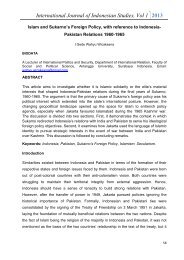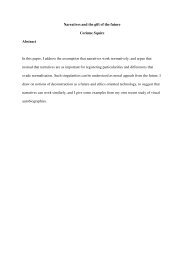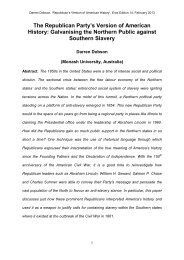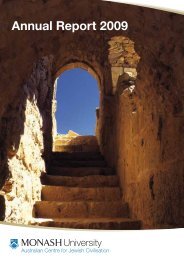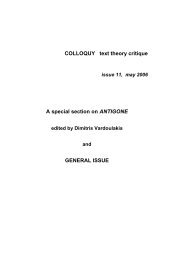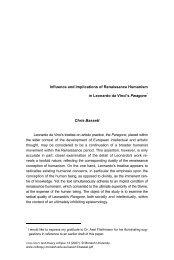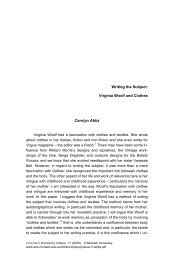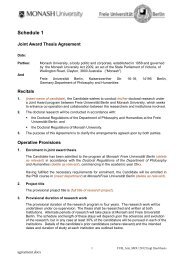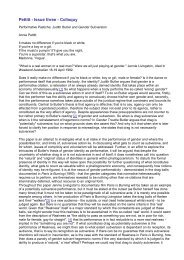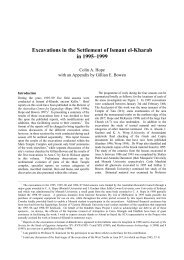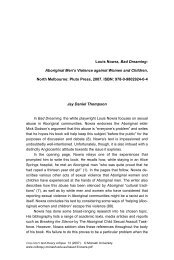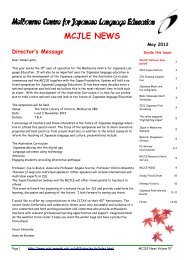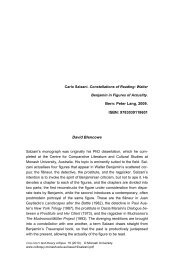The Acknowledgement of Love in Sarah Ruhl's Drama ... - Arts
The Acknowledgement of Love in Sarah Ruhl's Drama ... - Arts
The Acknowledgement of Love in Sarah Ruhl's Drama ... - Arts
You also want an ePaper? Increase the reach of your titles
YUMPU automatically turns print PDFs into web optimized ePapers that Google loves.
22Thomas Butler░cludes, “<strong>The</strong> reason is that this is our orig<strong>in</strong>al natural state and we used to bewhole creatures: ‘love’ is the name for the desire and pursuit <strong>of</strong> wholeness” (26).Further: “our human race can only achieve happ<strong>in</strong>ess if love reaches its conclusion,and each <strong>of</strong> us f<strong>in</strong>ds his loved one and restores his orig<strong>in</strong>al nature.” Plato,<strong>The</strong> Symposium, trans. Christopher Gill (New York: Pengu<strong>in</strong>, 1999), 26–27.26 John Lahr reports that the vocabulary lesson and even the specific words (“ostracize,”“peripatetic,” and “defunct”) were tributes to Ruhl’s own father, Patrick:“Each Saturday, from the time Ruhl was five, Patrick took his daughters to theWalker Bros. Orig<strong>in</strong>al Pancake House for breakfast and taught them a new word,along with its etymology.” Lahr, “Surreal Life.”27 Cavell establishes this difference between know<strong>in</strong>g and acknowledg<strong>in</strong>g <strong>in</strong> his earlywork Must We Mean What We Say? (1969), <strong>in</strong> which his essay on K<strong>in</strong>g Learorig<strong>in</strong>ally appeared. Acknowledgment adds ethical force to knowledge: “Acknowledgmentgoes beyond knowledge. (Goes beyond not, so to speak, <strong>in</strong> the order <strong>of</strong>knowledge, but <strong>in</strong> its requirement that I do someth<strong>in</strong>g or reveal someth<strong>in</strong>g on thebsis <strong>of</strong> that knowledge.)” Cavell, “Know<strong>in</strong>g and Acknowledg<strong>in</strong>g,” <strong>The</strong> Cavell Reader,ed. Stephen Mulhall (Oxford: Blackwell, 1996), 63.28 Gerald L. Bruns, Tragic Thoughts at the End <strong>of</strong> Philosophy: Language, Literature,and Ethical <strong>The</strong>ory (Evanston: Northwestern University Press, 1999), 184.29 “What we need is not rebirth, or salvation, but the courage, or pla<strong>in</strong> prudence , tosee and to stop. To abdicate.” That is, we need to abdicate the certa<strong>in</strong>ty <strong>of</strong> ourknowledge and to acknowledge people and th<strong>in</strong>gs as they are, irrespective <strong>of</strong> ourcognitive designs on them. Stanley Cavell, Disown<strong>in</strong>g Knowledge <strong>in</strong> Six Plays <strong>of</strong>Shakespeare (Cambridge: Cambridge University Press, 1987), 81.30 Ibid., 61.31 Ibid., 69.32 Ibid., 61. An important part <strong>of</strong> Cavell’s essay, which I cannot treat fully here, exam<strong>in</strong>eshow Lear’s failure <strong>of</strong> acknowledgment carries over to readers <strong>of</strong> the play.Cavell po<strong>in</strong>ts to several questions <strong>in</strong> the play that have consistently baffled readersover the years: why, for example, does Edgar wait on reveal<strong>in</strong>g himself to hisbl<strong>in</strong>d father, or why does Goneril send Gloucester to Dover? <strong>The</strong> answers are obvious,Cavell says (Edgar avoids recognition as Lear does, and Goneril confusesGloucester with Lear), and <strong>in</strong> fail<strong>in</strong>g to see them “we are implicated <strong>in</strong> the failureswe are witness<strong>in</strong>g; we share the responsibility for tragedy.” Cavell, Disown<strong>in</strong>gKnowledge, 54.33 William Shakespeare, K<strong>in</strong>g Lear, ed. Grace Ioppolo (New York: Norton, 2008),5.3.9.34 Cavell, Disown<strong>in</strong>g Knowledge, 108.35 Ibid., 109.36 Ibid., 109.37 Ibid., 63.38 Ibid., 65.39 Shakespeare, K<strong>in</strong>g Lear, 1.1.60.



